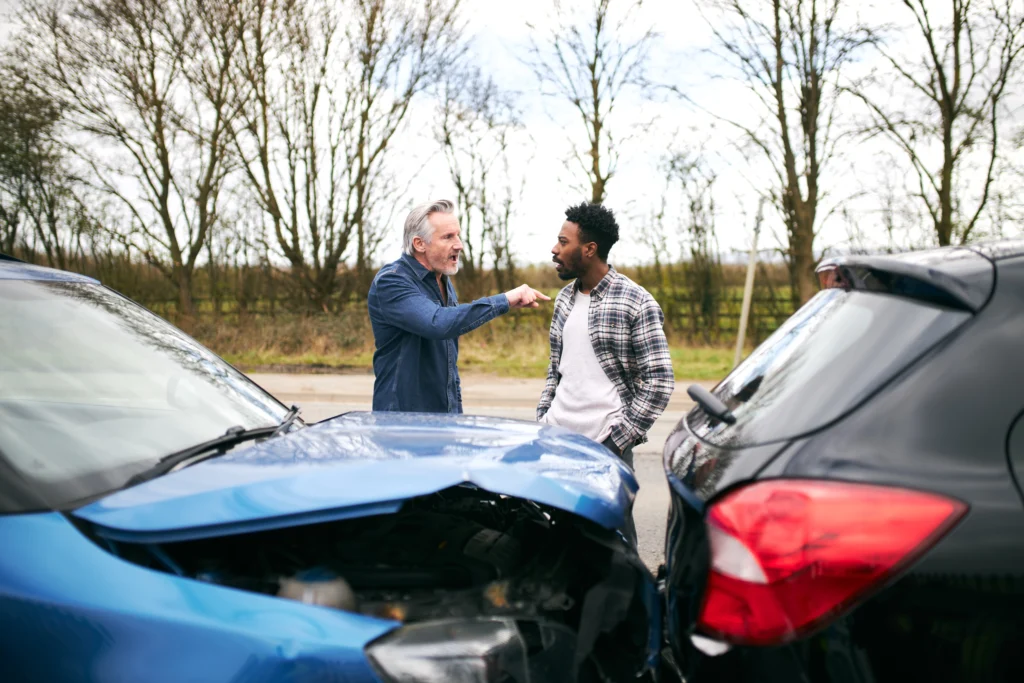
Accidents are an unavoidable reality for anyone who spends time on the road. Whether it’s a minor bump or a significant crash, knowing what to do when someone hits your car is essential. Proper action protects your rights and helps ensure fair compensation. At Evans Litigation & Trial Law, we’re ready to support you through this challenging time.
What to Do After a Car Accident?
While every situation is unique, there are certain steps you can follow to make the minutes, days, and months after a car accident less stressful.
Step 1: Prioritize Everyone’s Safety
Protecting yourself and others is the first concern. If possible, move your vehicle to a secure location away from traffic and activate hazard lights to warn approaching drivers. Then, quickly assess whether anyone has been injured. In the event of an injury, immediately contact 911 to request emergency assistance and police presence.
Even when injuries are not apparent, calling local law enforcement is vital. In Georgia, having a police report can be a key factor for future insurance claims or legal action.
Step 2: Collect Necessary Information
Once everyone is safe, gather essential details from the other driver. Maintain a courteous demeanor while refraining from admitting any fault. Obtain the following from the other driver:
- Contact information like name, address, and telephone number;
- Insurance provider and policy number;
- Driver’s license number; and
- Vehicle make, model, and license plate number.
Photographing their insurance card and driver’s license with permission ensures accuracy. Comprehensive information simplifies the claims process and safeguards your rights.
Step 3: Record the Accident Scene
Documenting the scene immediately after the accident is crucial. Use your phone to capture images or videos of:
- Vehicle damage;
- The accident site, including traffic signs, lights, and road conditions; and
- Any visible injuries sustained by you or passengers.
Additionally, request contact details from witnesses. Their statements may prove critical in resolving disputes about the incident.
Step 4: File an Official Police Report
Georgia law requires you to report an accident when injuries, fatalities, or property damage exceeding $500 occur. Even for minor damage, a police report creates an official record that can prove invaluable. Share accurate details with the officer, and report any suspicions of impaired or distracted driving by the other party.
Step 5: Notify Your Insurance Provider
Promptly inform your insurance company about the accident. Provide all collected details, such as photos, witness statements, and the police report number. Be thorough, but avoid speculating about fault until all facts are clear.
If the other driver’s insurer contacts you, consult an attorney before making any statements. Insurance adjusters may attempt to use your statement to reduce the value of your claim or shift blame.
Step 6: Seek Medical Attention Without Delay
Even if you feel uninjured immediately after the collision, it’s wise to get evaluated by a healthcare provider. Injuries like whiplash or internal trauma might not manifest symptoms right away. Medical records also serve as vital evidence if you pursue compensation.
Step 7: Understand Georgia’s Car Accident Laws
If you are considering filing a car accident lawsuit, it is important to understand Georgia laws about car accidents, as they can be complicated. Georgia operates under a fault-based system, holding the responsible driver and their insurance accountable for damages. Determining liability, however, can be complex. Factors such as distracted driving, adverse weather, and vehicle maintenance often play a role.
The state follows a modified comparative negligence rule, allowing you to recover damages if your share of fault is under 50%. Compensation is adjusted based on your percentage of responsibility. For instance, if you are deemed 20% at fault in a $10,000 claim, your recovery would be $8,000.
Step 8: Identify Available Compensation
Victims of car accidents in Georgia may qualify for various forms of compensation, including:
Medical costs
Encompassing a wide range of health care expenses following the accident, these damages cover not only immediate emergency room visits but also ongoing treatments, rehabilitation, medications, and any necessary medical equipment. It’s important to keep all receipts and documentation, as these will support your claim and help establish the full extent of your medical needs.
Property loss
Property loss damages include the costs associated with repairing or replacing your vehicle after an accident. If your car is deemed a total loss, you may be entitled to its fair market value. Additionally, any personal belongings damaged in the accident, such as electronics or other items inside the vehicle, may also be claimable. Documenting the condition and value of your property before the accident can help substantiate your claim.
Lost income
If you’ve had to take time off work due to injuries sustained in the accident, you may be eligible for compensation for lost wages. This can include your salary as well as any bonuses, benefits, or other forms of compensation you would have received had you not been injured. Collecting pay stubs and employment verification can strengthen your case for lost earnings.
Emotional distress
Accidents can lead to significant emotional and psychological impacts, including anxiety, depression, and PTSD. Compensation for emotional distress accounts for the pain and suffering you’ve experienced and your diminished quality of life following the incident. Documenting your emotional struggles through therapy records or personal journals can provide valuable evidence for this type of claim.
Understanding these various forms of compensation can empower you to seek the full recovery you deserve. Consulting with an attorney experienced in car accident cases can help you navigate the complexities of your claim and ensure that all potential compensation avenues are explored.
Step 9: Consult a Skilled Attorney
Navigating insurance claims and legal processes can feel overwhelming, especially while recovering from injuries. At Evans Litigation & Trial Law, we have extensive experience handling car accident cases. From negotiations with insurers to courtroom advocacy, our team works hard to protect your interests.
An attorney ensures your rights are upheld and prevents you from accepting insufficient settlement offers. We work tirelessly to secure the compensation you deserve.
Step 10: Take Timely Action
Georgia enforces a two-year statute of limitations for personal injury claims, which means you have a limited window to take legal action after an accident. If you fail to file your claim within this time frame, you may forfeit your right to recover damages, leaving you responsible for your medical bills and any other losses. It is crucial to keep this statute in mind, as it ensures that cases are resolved while evidence and witness memories are still fresh.
Acting promptly not only helps preserve evidence but also strengthens witness testimony. The longer you wait, the more difficult it may become to gather relevant information regarding the accident. Witnesses may forget key details or their contact information could become outdated. Additionally, timely medical attention can establish a clear link between the accident and any injuries sustained, which is vital for your case.
What to Do If Someone Hits Your Car: Contact Us
Understanding what to do when someone hits your car can reduce stress and financial burdens. By following these steps and enlisting the right legal support, you can focus on recovery while we handle the complexities of your case. If you’ve experienced a car accident in Georgia, reach out to Evans Litigation & Trial Law for a free consultation. We’re here to guide you every step of the way.


